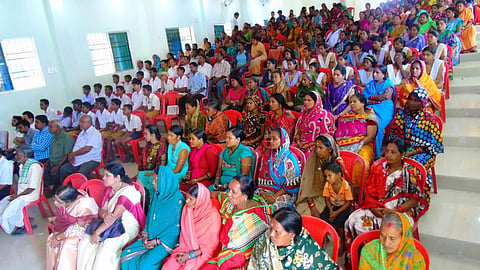
- Topics
- Feature
- Opportunities & Events
- About
- Hindi Portal
- Data
- Topics
- Feature
- Opportunities & Events
- About
- Hindi Portal
- Data

Gyanchand Mishra, Councillor of Ward 3, is the President of the Ward Sanitation Committee (WSC) and is also a member of the City Sanitation Task Force (CSTF). As a member of these two institutions, he has leveraged support from the Dhenkanal Municipality and Project Nirmal to improve the sanitation situation in his ward. As a result of his efforts, Ward 3 was declared open defecation free.
Due to the rigorous community mobilisation process, all households in the ward now have toilets that are connected to septic tanks and the containment structures are regularly emptied with the help of a mechanical suction machine being operated by the Dhenkanal Municipality. The collected faecal sludge and septage is treated at the Dhenkanal Faecal Sludge Treatment Plant (FSTP) at Mahisapat.
Mishra has led many other community development and infrastructure upgradation initiatives in his ward including upgradation of the cremation ground and provision of toilet complex within its precincts; cleaning of a pond located in the ward which had become a receptacle for wastewater coming from open drains; and negotiating with the Dhenkanal Municipality to procure additional mechanical suction machines for providing emptying services.
“While a low-cost end-to-end decentralized sanitation system has been put in place in Dhenkanal Municipality with the active involvement of the community (through SSCs and WSCs), government agencies and local political leaders making it work sustainably is the biggest challenge facing the CSTF and the Dhenkanal Municipality,” says Mishra.
All this was facilitated under Project Nirmal, which worked on the demonstration of appropriate, low-cost, decentralized, inclusive and sustainable sanitation service delivery solutions for two small towns (Angul and Dhenkanal) in Odisha.
To ensure inclusive and sustainable sanitation solutions, community engagement platforms have been created at the slum and ward level here. The idea is to ensure that the marginalised and vulnerable communities residing in slum settlements are actively involved in planning and implementation of sanitation services. These community institutions have been entrusted with the responsibility of articulating collective demand for sanitation at the slum and ward level as well as to collaborate and/or negotiate with the local/ state government agencies for the fulfilment of their sanitation-related needs and aspirations.
It is hoped that this bottom-up planning approach would ensure that grassroots issues related to sanitation are well understood and adequately addressed in the city level sanitation plans. Further, these community institutions were also envisioned to take on information dissemination, demand creation and Behaviour Change Communication (BCC) roles.
Three-tiered community engagement structure (at slum, ward and city level)
A three-tier structure for community engagement has been put in place at the slum, ward and city level in Angul and Dhenkanal Municipalities. While the slum level institutions, that is, the Slum Sanitation Committees (SSCs), aren’t a part of the formal urban governance structure the institutions at the ward and city level, namely, the Ward Sanitation Committees (WSCs) and the City Sanitation Task Force (CSTF) have been constituted under the provisions of the Odisha Urban Sanitation Policy (2017) and the Odisha Urban Sanitation Strategy (2017).
Slum Sanitation Committees (SSCs)
Ward Sanitation Committees (WSCs)
City Sanitation Task Force (CSTF)
Project Nirmal has been instrumental in facilitating formation of SSCs and WSCs and their capacity building to enable them to adequately address sanitation related issues/challenges in their respective slums and wards, along with facilitating their participation in city-level forums (i.e., CSTF) and interfacing with relevant government officials and agencies.
Lessons learnt
Slum and ward level community structures, i.e., SSCs and WSCs, have ensured active and meaningful participation of local communities in the planning and implementation of sanitation related initiatives. This process has also spurred many individuals to take on leadership positions in their respective communities and at the ward/city level. This process has also prompted them to expand their work to other community developmental themes beyond sanitation.
Aspects to consider while facilitating community structures
Community engagement structures, especially at the slum and ward level, cannot be expected to take on roles without adequate capacity building and training inputs and providing these inputs are crucial for ensuring that these structures are strong and can fulfil their roles and responsibilities effectively.
To ensure that there is effective and meaningful participation of local communities, through members and volunteers of community engagement platforms, meetings must be organized at convenient locations and timings. The location and timing of the meetings must take into cognizance the special needs of women.
The criteria for the selection of members and volunteers must be spelt out to ensure that only those community members who have the time and the motivation to participate are inducted as members.
The project was completed in 2020 and was implemented by Centre for Policy Research and Practical Action with support from Bill and Melinda Gates Foundation; Arghyam; Housing and Urban Development, Government of Odisha; and Municipalities of Angul and Dhenkanal.
The article based on the research learning note 'Project Nirmal: Community Engagement Processes For Planning and Implementing Sanitation/FSSM Interventions’ is a part of the series demonstrating learning and outcomes of the Project Nirmal based on Scaling City Institution for India (SCI-FI)’s research on water and sanitation. More on the series: https://twitter.com/CPR_SCIFI